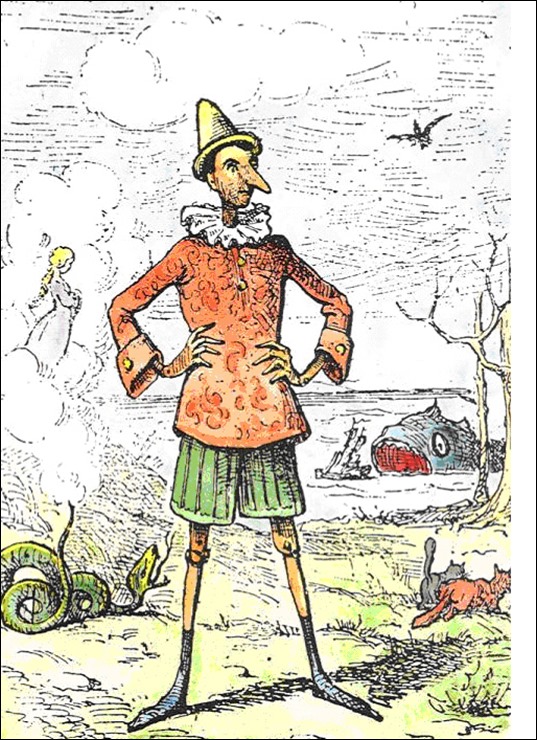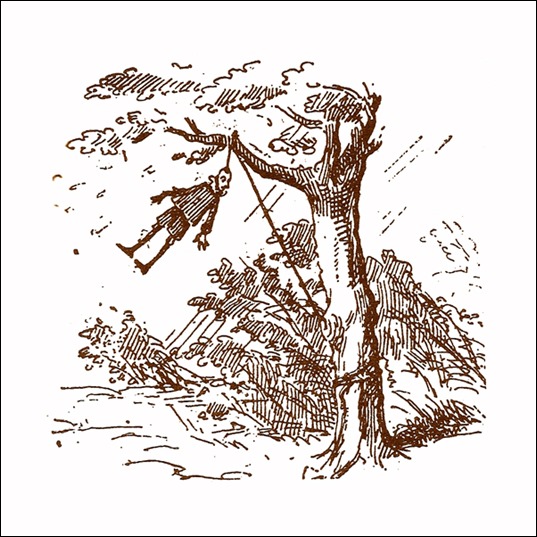Will The Real Pinocchio Please Stand Up Posted by Geoff on Jan 20, 2014 in Italian Language
My current bedtime reading, Le Avventure di Pinocchio, given to me by my brother in law Gippi, is turning out to be a real revelation in several unexpected ways. Having grown up in England my only previous knowledge of Pinocchio was the endearing mischievous puppet from Disney’s famous 1940 musical animation. Certainly a classic piece of children’s entertainment, but Disney, as I’m discovering, took some pretty big liberties with the original story.
 |
| An original illustration by Enrico Mazzanti for Le Avventure di Pinocchio |
C’era una volta…
– Un re! – diranno subito i miei piccoli lettori.
No, ragazzi, avete sbagliato. C’era una volta un pezzo di legno.
Once upon a time there was…
– A King! – my little readers will immediately say.
No, children, you’re wrong. Once upon a time there was a piece of wood.
So begins the fantastic ‘Adventures of Pinocchio’ (Storia di un Burattino) written in the 1880’s by journalist Carlo Lorenzini under the pseudonym Collodi. The ‘real’ Pinocchio, however, is initially a far darker and unpleasant character than Disney’s sentimentalised interpretation. Here is il grillo parlante’s (the talking cricket’s) description of the puppet: "
– Quel burattino lì, – seguitò a dire il Grillo-parlante, – è una birba matricolata…
Pinocchio aprì gli occhi e li richiuse subito.
– è un monellaccio, uno svogliato, un vagabondo.
Pinocchio si nascose la faccia sotto i lenzuoli.
– Quel burattino lì è un figliuolo disubbidiente, che farà morire di crepacuore il suo povero babbo!..
– That puppet there, the Talking Cricket continued, – is a certified scoundrel…
Pinocchio opened his eyes then closed them quickly again
– is a brat, a slacker, a vagabond.
Pinocchio hid his face under the sheet.
– That puppet there is a disobedient son, who will make his poor father die from a broken heart!..
The original story is full of wonderful obsolete words and Tuscan expressions such as ‘il fatto gli è’ (the fact it is): “Non so come andasse, ma il fatto gli è che un bel giorno questo pezzo di legno capitò nella bottega di un vecchio falegname” (I don’t know how it came about, but the fact is that one fine day this piece of wood ended up in the workshop of an old carpenter), and ‘tu mi hai fatto male’ (you, you have hurt me): “E ripresa l’ascia in mano, tirò giù un solennissimo colpo sul pezzo di legno. – Ohi! tu m’hai fatto male! – gridò rammaricandosi la solita vocina.” (“And taking up the axe again in his hand, brought down a great big blow on the piece of wood. – Hey! you hurt me! – cried the same little voice.”)
Then we have corbello, an obsolete word for basket: “guardò nel corbello dei trucioli” (he looked in the basket of wood shavings), and uscio, Tuscan for door: aprì l’uscio di bottega (he opened the workshop door).
 |
| Pinocchio hung from the tree and left to die by ‘gli assassini’ |
Le Avventure di Pinocchio is also much scarier than I imagined, and the chapter with the following preface, “Pinocchio, per non aver dato retta ai buoni consigli del Grillo-parlante, s’imbatte negli assassini” (“Because he didn’t listen to the Talking Cricket Pinocchio runs into the assassins”), is particularly nightmarish.
In part 2 of this blog I’ll look at another extract from Pinocchio’s adventures in which he first encounters ‘la bella Bambina dai Capelli Turchini’ (The Fairy with Turquoise Hair).

Build vocabulary, practice pronunciation, and more with Transparent Language Online. Available anytime, anywhere, on any device.




Comments:
Janice Floyd Durante:
Geoff, I found Collodi’s classic novel quite thought-provoking. While I enjoyed reading it aloud to my daughter, I was often surprised by the novel’s elements of darkness. You might like to check out the post I wrote about this at http://readaloudsforallchildren.wordpress.com/2012/07/26/oh-pinocchio-say-it-isnt-so/
Geoff:
@Janice Floyd Durante That’s a really nicely written article Janice, and a good analysis of the underlying themes of the book. I assume you read it in English, or do you speak Italian as well?
Saluti da Geoff
andreas:
Ciao Geoff!
Anch’io ho già letto ” Le avventure di Pinocchio” in italiano, ma il loro trama non mi ha sorpreso, perché avevo già letto moltre altre fiabe nella versione per i adulti(vuol dire più arcaica) e tutte sono davvero assai tetre perche erano state scritte quando la vita quotidiana era molto più difficile che della vita di oggi. Forse allora non sembravano tanto tetre.
Saluti da andreas(Andrej)
Janice Floyd Durante:
Geoff, ho letto l’edizione bilingue che è stato tradotto da Nicolas J. Perella.
Saluti da Janice
Janice Floyd Durante:
E grazie mille, Geoff!
Saluti da Janice